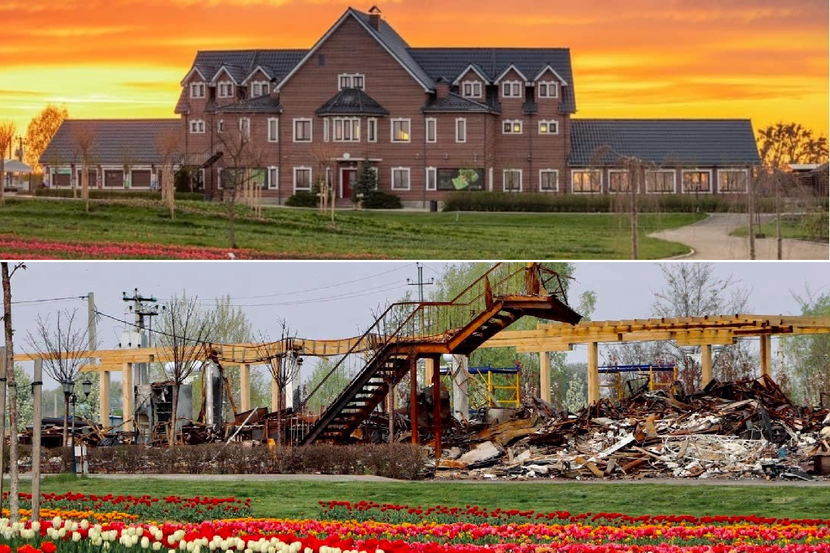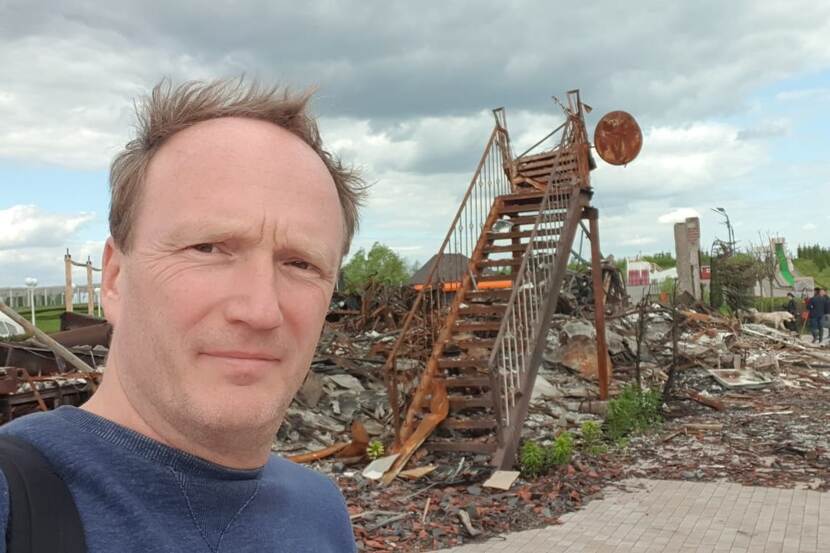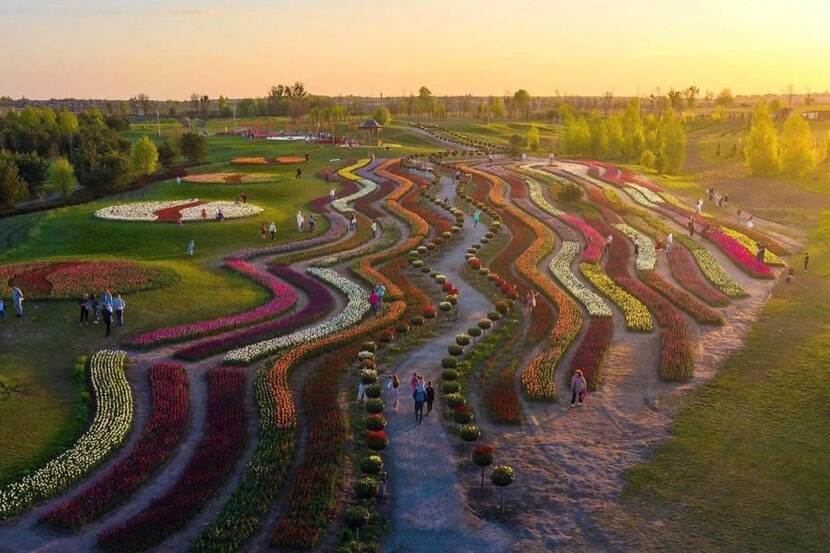Ukraine: nurturing beauty and resilience amid war
In the interview to FloraCulture International Arno Klijbroek explained that despite the war, business in Ukraine continues within the limits of what is possible. Ukrainian entrepreneurs are not waiting for the war to end to invest; many are making significant investments now, recognising the potential for post-war opportunities. This fighting spirit gives confidence that Ukraine will make it through these horribly difficult times.

The Russian invasion of Kyiv on February 24, 2022, marked a turning point in Arno Klijbroek’s life. It redirected his entrepreneurial spirit and adaptability into the humanitarian mission of the De Leeuw Kyiv Foundation. Now, he tirelessly supports Ukrainians with aid and hope, a mission that has become his life's work...well, at least until the war ends. Klijbroek took a break from his altruistic work to have a WhatsApp call with FloraCulture International (FCI) Associate Editor Rachel Wakefield.

Arno Klijbroek is a dynamic Dutch entrepreneur, resilient, dedicated and passionate advocate for Ukraine. He has spent nearly 25 years of his working life in Kyiv and has developed a deep connection with the country and its people. He started his professional journey in Ukraine by setting up a representative office for Nutricia and later founding his own trading company, ATM Trade Management, in 2000. Through this, he represents Dutch equipment manufacturers specialising in industrial vegetable processing, and imports Dutch tulip bulbs for Stokolex from Dirkshorn, near his hometown of Tuitjenhorn, Netherlands.
FCI: What was your experience in Kyiv on the 24 February 2022?
Arno Klijbroek: “It was five in the morning, and I heard the bombs landing nearby. My home was shaking. In a hurried 45 minutes, my wife Lesia and I packed our belongings into the car. We made a brief stop to say goodbye to my in-laws, and we headed for the Netherlands, where my daughter, Katja, was safely with my parents.
It was so strange at that moment. There had been warning messages for weeks before, but we thought it was unimaginable, it was just a threat. We thought, it would be absurd for them to act on it. So when the Russians did invade, it was a chaotic and alarming situation.
After two days of driving I was back in the Netherlands. The chatter in our Dutch WhatsApp group made us all realise we needed to do something for our friends in Ukraine. Instinctively, we knew we could help. We are entrepreneurs; we have our logistics partners in Europe and in Ukraine. We thought, okay, we’re ready. We are going to use our knowledge to basically ship everything that we can get our hands on in the Netherlands to help Ukraine. It was very spontaneous, and it all came together in a matter of one or two days, and we started shipping.
The first time I went back to Kyiv was in May, after the Russians had retreated, and ever since then I’ve been living and working alternately in Tuitjenhorn, Netherlands, and Kyiv, Ukraine.”
FCI: Tell me about the impact of the war because I don’t think we know enough?
“The current trench warfare is taking place on a frontline that stretches over 800 km along the Eastern and North-Eastern borders. It’s real hand-to-hand combat. The Russians also drop thousands of bombs, including the deployment of cluster and phosphorus versions, grenade strikes, drone attacks, and a whole assortment of rocket assaults including supersonic and ballistic missiles.
Despite these frightening challenges, life continues “normally” in Central and Western regions of Ukraine, including Kyiv. Living here, you have to reset your markers of what is safe and what is normal. Ukrainians have to deal with frequent power cuts because the Russians continually destroy electricity production sites – they haven’t dared attack the nuclear power stations yet. So, having an emergency generator in your home here is nearly as common as having an internet connection.
To help you understand, Ukraine is the largest country in Europe. It is one and a half times the combined size of Germany, Belgium, and the Netherlands. This means you can travel safely through large parts of the country. To give more perspective, the distance from Kyiv to the frontline is about 450-500 km—the same distance between London and Paris or Amsterdam and Berlin.
The war is impacting deeply here; everyone has a relative or friend serving in the army, and everyone knows about someone who has been killed or badly injured or is currently facing torture in a Russian prisoner-of-war camp. The official figures are incomplete, but the truth is that thousands of Ukrainian soldiers and civilians have been killed, with tens of thousands of Ukrainians wounded or facing permanent disability.
I do find it tragic that since the beginning of the war, attention from Europe has dropped tenfold while the intensity and number of Ukrainian casualties have increased tenfold.
It is mind-blowing to me that even now, very few people in Europe realise the scale of this war. Ukraine needs everybody’s attention and active participation now.”
FCI: How has the war impacted your business and the wider Ukrainian business community?
“Despite the war, business in Ukraine continues within the limits of what is possible. Work for my ATM Trade Management company has slowed but has not stopped my operations. We continue to work with European companies, mostly Dutch, but not exclusively. However, the focus has shifted, and my presence in Ukraine provides confidence and context for these companies. Of course, there are travel restrictions in Ukraine because of the war. For me, it’s not a problem. I can travel in and out because I have a Dutch passport, and a Ukrainian resident permit, but many of my Ukrainian clients understandably cannot because of the mobilization law. So, I work in an advisory role, helping international businesses navigate the Ukrainian market in these uncertain times.
I speak daily to Ukrainian entrepreneurs who are not waiting for the war to end to invest; many are making significant investments now, recognising the potential for post-war opportunities. This fighting spirit gives me confidence that Ukraine will make it through these horribly difficult times.”
FCI: What is the De Leeuw Kyiv Foundation?
“The De Leeuw Kyiv Foundation was established in 2006 by Dutch expatriates like myself to promote the Dutch language and culture in Ukraine. The initiators are Guido van Engelen, Emmeke Vierhout, Kees Huizinga, Floris Schuring, Noud Bongers and myself.
Following the Russian invasion, the Foundation shifted its focus to humanitarian aid. We coordinate the efforts organising weekly shipments of essential supplies such as generators, satellite Starlink telephones, all-terrain vehicles, anti-drone nets, medical supplies, food stuff, and water filters to Ukraine. These supplies are vital for both civilian and military use. When the war started, the Dutch Government granted us special ANBI status [Algemeen nut beogende instelling – Public Benefit Organisation], so our intentions are legitimately recognised for raising funds for humanitarian causes in Ukraine by the Netherlands.
The De Leeuw Kyiv Foundation has sent hundreds of truckloads of aid and 4x4 cars and minivans to frontline areas for logistical support and evacuations. Supported by donations from companies and individuals, the Foundation operates with zero bureaucracy, everybody works on a voluntary basis, ensuring that aid reaches those who need it most. The Foundation’s total value of relief goods is well over 12 million euros. We receive many positive thank-you messages, including from high-profile figures like the Mayor of Kyiv.”
FCI: What are some of the challenges you find working with the De Leeuw Kyiv Foundation in delivering aid to Ukraine?
“Personally, I travel to Ukraine from the Netherlands once a month for a 30-hour trip to meet my business contacts, catch up with friends, and learn more about how the De Leeuw Kyiv Foundation can provide assistance.
This journey is physically and emotionally taxing, yet I remain committed to ensuring that necessary supplies reach their destination. The logistical challenges are significant, but despite the war, our Foundation’s team is built on long-standing trust and friendship, and it operates effectively to support Ukraine. The common perception that importing into Ukraine is a bureaucratic nightmare is wrong; you need to do your homework and get advice from people with experience. For the Foundation, we have streamlined the process of registering and transporting goods, ensuring efficient delivery to frontline areas. It’s all tracked on an electronic system, so there’s no abuse under the flag of humanitarian aid.”
What message do you have for international companies considering engagement with Ukraine?
“I urge international companies to engage with Ukraine now. I believe that showing interest and offering genuine support during these difficult times will be beneficial in the long run. The local business community is leading the way, and foreign companies with a presence or interest in Ukraine can play a crucial role in the country’s recovery. The Foundation is committed to providing humanitarian support and helping rebuild Ukraine, showcasing the resilience and determination of its people. The De Leeuw Kyiv Foundation’s website, www.deleeuwkyiv.nl, provides information on how to contribute to our humanitarian efforts.”
FCI: Would you call yourselves heroes?
“No, no, no, the real heroes, they’re the ones in Ukrainian military uniform in the frontline. I mean, we’re doing quite a good job, within the means that we have, we’re doing what we can.
Ukraine is full of heroes, but we are not in that line. I see them in military trucks or army vehicles driving off to the East. Those guys are the heroes.”
Klijbroek shared with details of two businesses in Ukraine with inspiring stories, continued in an extended version of Vis-à-Vis. Latest Edition of the FloraCulture International Magazine • FCI (aiph.org) and will be published here in coming week.
